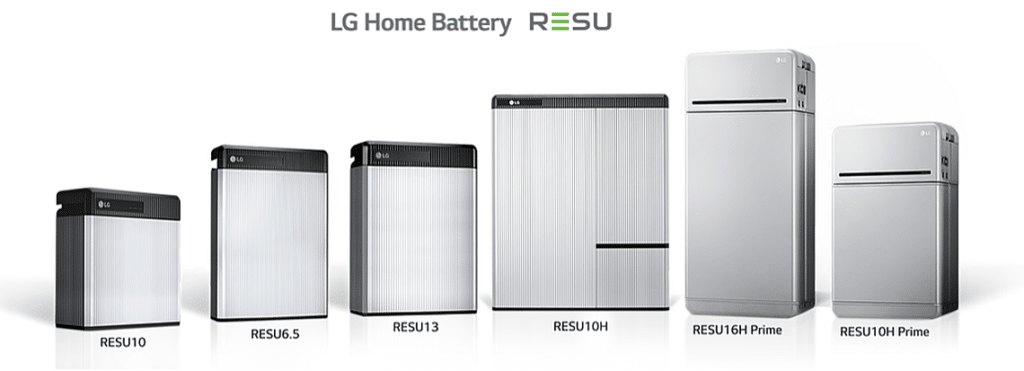In 2018, technology powerhouse LG diversified into the home energy storage market, using its extensive six-decade history in the electronics sector to produce some of the most advanced batteries in recent times. The focus of this review is the LG Residential Energy Storage Unit (RESU), one of the market’s most sought-after battery series.
It’s worth mentioning that LG recently chose to withdraw from the solar panel market. The company stated it would refocus its energy efforts on emerging sectors such as Energy Storage Systems (ESS), energy management solutions, and other future technologies in the sustainability domain.
Formerly a part of LG Chem, LG Energy Solution is the rebranded entity responsible for the company’s battery portfolio.
Cons:
Modern batteries, chemical devices designed to store and release energy, are especially well-suited for use with renewable energy sources like solar and wind power that are intermittent by nature.
The LG RESU series captures surplus solar energy during daylight hours for later use, either during nighttime or peak pricing periods. This feature is highly beneficial for countering power outages or even for establishing a completely independent solar energy system.
RESU batteries store the collected solar energy as direct current (DC). When you need to use the stored energy, the battery sends it to an inverter that transforms it into alternating current (AC), the form of electricity that powers household appliances.

Among various battery types, lithium-ion and lead-acid are prevalent. The RESU series employs lithium-ion batteries featuring nickel-manganese-cobalt (NMC) cells. These batteries are safer, more efficient, and have a longer lifespan compared to traditional lead-acid batteries. They also boast higher energy density, enabling more energy storage in a compact space.
| MODEL | LG RESU10H-R | LG RESU10H-C | LG RESU 10H PRIME | LG RESU 16H PRIME |
| Total energy capacity (kWh) | 9.8 kWh | 9.8 kWh | 9.6 kWh | 16 kWh |
| Power rating (continuous) | 5.0 kW | 5.0 kW | 5.0 kW | 7.0 kW |
| Power rating (peak) | 7.0 kW | 7.0 kW | 7.0 kW | 11.0 kW |
| Voltage range (V) | 350-450 V | 350-450 V | 350-450 V | 350-450 V |
| Dimensions (W x H x D, inches) | 29.3 x 35.7 x 8.1 | 29.3 x 35.7 x 8.1 | 19.8 x 32.2 x 11.6 | 19.8 x 42.8 x 11.6 |
| Approximate weight (lbs) | 214 lbs | 220 lbs | 244 lbs | 350 lbs |
| Warranty | 60% capacity after 10 years | 60% capacity after 10 years | 70% capacity after 10 years | 70% capacity after 10 years |
Until 2021, the primary offering was the LG Chem RESU 10H, with a storage capacity of 9.8 kWh. LG then introduced its third-generation RESU Prime series, featuring two new models: the 10H Prime with a 9.6 kWh capacity and the 16H Prime, offering a generous 16 kWh of storage.
These models are compatible with major solar inverter brands such as SMA and SolarEdge and have been optimized for scalability, allowing multiple units to be connected to increase energy storage.
LG provides a ten-year warranty for all RESU models, with guarantees on remaining capacity differing slightly between older and newer models. The 10H offers 60% capacity after ten years, while the newer Prime models promise at least 70%.
Regarding costs, the 10H models generally range from $7,000 to $9,000, including installation, while the larger 16H version can go up to $13,000. Though not the cheapest on the market, LG’s reputation for reliability and quality justifies the cost for many consumers.
| LG RESU | TESLA POWERWALL II | GENERAC PWRCELL | |
| Capacity | 9.6 – 16 kWh | 13.5 kWh | 9 – 18 kWh |
| Price | $7000 – $13000 | $12,750 | $9,999 and above |
| Warranty | 10 years | 10 years | 10 years |
| Battery Chemistry | Li-ion (NMC) | Li-ion (NMC) | Li-ion (NMC) |
| Depth of Discharge (DoD) | 95% | 100% | 84% |
| Scalability | Yes | Yes | Yes |
LG’s RESU compares favorably with other top brands like Tesla’s Powerwall and Generac’s PWRcell, offering comparable features, capacities, and warranties.
Although LG’s RESU batteries can contribute to reducing your electricity bill, their primary function is to provide reliable backup power during outages. They represent a secure investment given LG’s historical reliability and financial stability. Their compact design and user-friendly features make them an excellent choice for anyone prioritizing a blend of innovation, quality, and long-term support over initial cost savings.
If you are looking to build out your or commercial solar system, reach out to the best solar panel installers in North Carolina. Contact 8MSolar’s team of professionals today to help solve your energy needs.
This content was originally published here.
